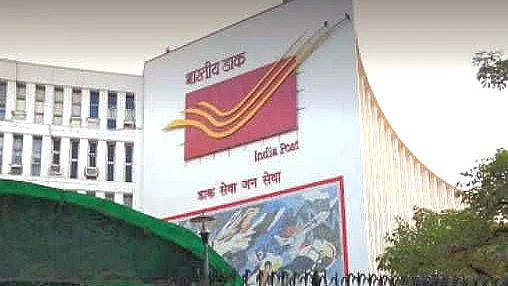COVID-19 lockdown: The last straw that broke the postman’s back
A senior official at headquarters of Department of Posts (DoP) in New Delhi estimated at least a 40 per cent reduction in footfall in post offices across the country as the clampdown came into effect

A few weeks back, social media was abuzz at how Indian Postal Service delivered a letter sans proper address. In an unusual show of strength, the Indian postal service delivered a letter correctly to a person despite it having incomplete address and wrong name. A Twitter user, Navdeep Singh, shared the photo of the envelope with the caption: ‘Maj NavNeeT Singh, High Court, Panchkula, Haryana'... A distinguished service medal is due to our @IndiaPostOffice for delivering this letter to my residential address facing all odds, and that too in time." In the shared photo, it's not just the address that was incomplete, but the name mentioned was also wrong.
As Navdeep Singh's post went viral, Twitterati flooded social media with similar experiences dating back to the seventies onward. Another user remarked, "They have delivered something to me when even the city and pin code was wrong. They are buggy. But efficient." Such are the nostalgic tales of a nondescript but omnipresent government department - India Post.
India Post is slowly but surely fading away, living on the past glory and staring at a bleak future. The Department of Posts (DoP) in India, branded as India Post, is a government-operated postal system, which is part of the Ministry of Communications. It is the most widely distributed postal system in the world. It was founded in 1854 during British Raj by Lord Dalhousie. For more than 160 years, the Department of Posts (DoP) has been the backbone of the country’s communication and has played a crucial role in the country’s social and economic development. India Post is the largest postal network in the world with 1,54,965 post offices (as on March, 2017) of which almost 90 percent are in the rural areas.
With the spread of telephony, private couriers, internet and online applications and services, the core business activity of delivery of mails and parcels is on the wane for the India Post. It is now more into selling of government saving schemes, also known as 'post-office saving schemes'. While the multi-national courier providers are providing high priced and high speed service in mail delivery, the low priced services offered by domestic couriers are undercutting India post’s business. The growth and popularity of mobile telephone, online services and emergence of social media have also affected the traditional letter mail business of India Post.
Its other main business activity of money transfers (money orders) have reduced considerably after the emergence of anywhere banking, ATMs and online banking services.
Over the years, India Post salaries kept on climbing due to the implementation of pay panel awards, while revenue from traditional postal services has gone down due to the availability of cheaper substitution to traditional postal services. In the past three fiscal years, the revenue deficit (or loss) of India Post has ballooned nearly 150 per cent to Rs 15,000 crore in FY'19 from Rs 6,007 crore in FY'16, making it a white elephant.
In the past several years, India Post has diversified into new areas -- a payment bank, an e-commerce portal, selling financial products like a sovereign gold bonds, mutual fund and insurance products, offering passport services and selling railway tickets. But these new initiatives generate only marginal revenues. The bulk of its revenue still comes from its core business of mail & parcel delivery and the commission earned on sale of National Savings Schemes/ Saving Certificates.
Coronavirus pandemic and the 21- day nationwide lockdown seems to be the last straw that broke the back of India Post. The noisy post-office has fallen silent due to COVID-19 effect. The traditional postal services have been badly affected with the cancellation of trains and sealing of boarders between states.
India Post, part of the essential service list issued by the government, is operational but only partially. "During the lockdown to curtail the spread of COVlD-19, Post Offces are providing basic postal and financial services. Priority is being given to delivery of essential items through the postal network," the Ministry of Communications said in a statement. Post offices are functioning but with depleted staff.
During the lock-down, Post Office customers can avail only facility of withdrawal as well as deposit in Post Office Savings Bank and India Post Payments Bank. During the lockdown period, postmen in many urban areas have been given paid leave. In most urban areas, door delivery by postmen has been replaced by window collection at post office branches. However postmen in rural areas are still home-delivering mails.
A senior official at Dak Bhawan, the headquarters of Department of Posts (DoP) in New Delhi, estimated at least a 40 per cent reduction in footfall in post offices across the country as the virus-linked clampdown came into effect.
(V Venkateswara Rao is a retired corporate professional and a freelance writer.)
Follow us on: Facebook, Twitter, Google News, Instagram
Join our official telegram channel (@nationalherald) and stay updated with the latest headlines
